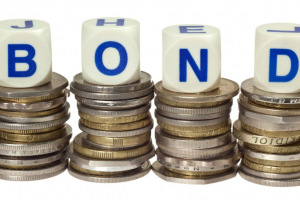What are bonds?
When you purchase shares, you are essential purchasing a part ownership in a company. Bonds on the other hand are debt obligations. A buyer of a bond is a lender, they are lending their money to a company or government in exchange for interest payments. A buyer of a $1,000 bond with a coupon of 5 percent paying semi-annually with a maturity of 10 years will receive $25 (2.5% *$1000) twice a year for the next 10 years. Then at maturity, the face value is repaid.
Rising interest rates are a negative for bonds. Bond yields go up when interest rates go up. When bond yields go up, bond prices go down.
To explain this let’s use an example.
Example of Bond Price Movements
Bonds are usually issued in denominations of $1000 known as the par. Bond prices are quoted in percentage terms so this is expressed as 100 or at par. The bond yield is the amount of income an investor receives on a bond.
If a 10-year bond is issued with a 5 percent interest rate (bond coupon) and interest rates go up, then this 5 per cent interest rate bond holder will struggle to sell it in the market as there are other bonds offering, say, a 6 percent coupon. To compensate for this, the 5 per cent bond holder will need to lower their bond price to make up for the difference in loss for the 1 percent interest rate coupon loss.
If interest rates drop, then this 5 per cent bond coupon becomes more attractive as newer issued bonds may have, say, a coupon rate of 4 percent. In this scenario the owner of this 5 per cent bond coupon can increase the bond price as it would be in higher demand than the newer issued ones of 4 per cent. Therefore there is an inverse relationship between bond prices and interest rates.
Why are bond prices important for the stock market?
Bond prices are closely monitored by traders in the stock market as it reflects the market’s perception of the direction of interest rates. Not many people know this, but the bond market is almost twice the size of the stock market. When bond prices go down, the market is factoring in an interest rate rise.
Traders are very interested in the direction of interest rate movements as this has a direct effect on the stock market. Companies borrow funds from banks to grow their business so an interest rate rise would increase their loan payment obligations. Banks are also affected as higher interest rates may lead to increased bad debts. Utilities, infrastructure stocks and REITS are also greatly affected when interest rates go up. We have previously looked at why this occurs in a previous post: https://fairmontequities.com/how-rising-bond-yields-affect-the-share-market/
Lauren Hua is a private client adviser at Fairmont Equities.
Sign up to our newsletter. It comes out every week and its free! You can leave your email with us via the form on the right-hand side of this page.
Otherwise you can email us at mail@fairmontequities.com
Disclaimer: The information in this article is general advice only. Read our full disclaimer HERE.
Like this article? Share it now on Facebook and Twitter!

